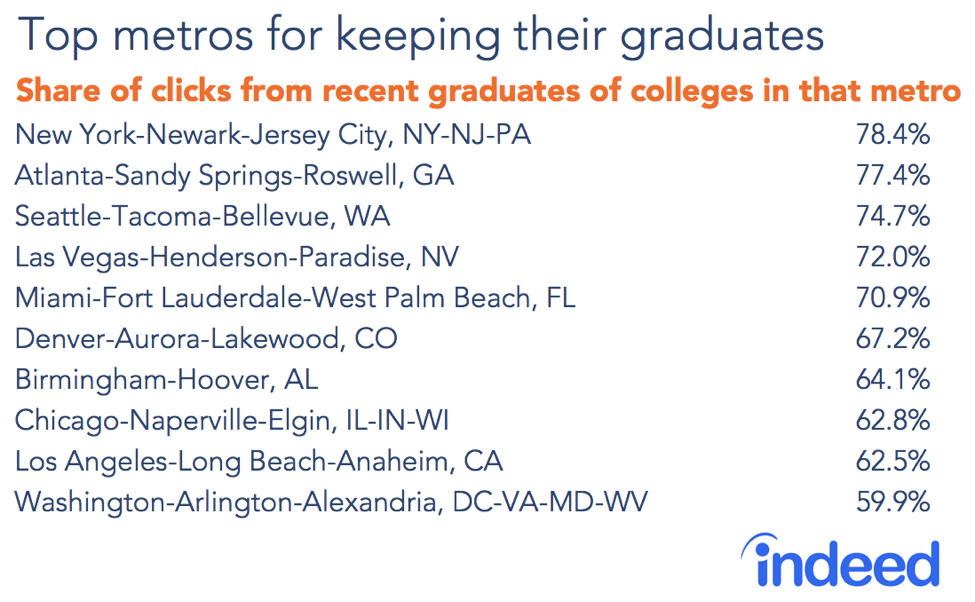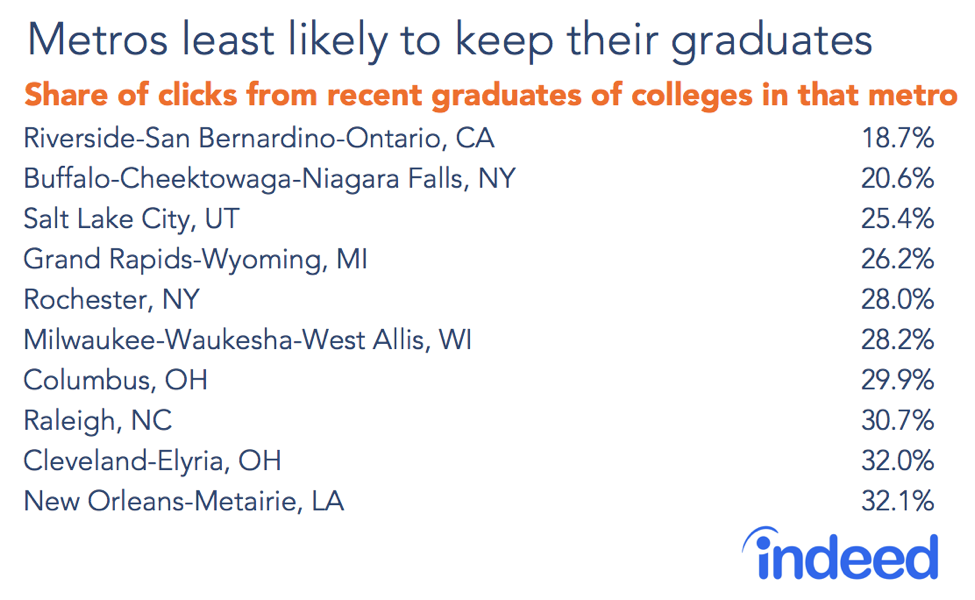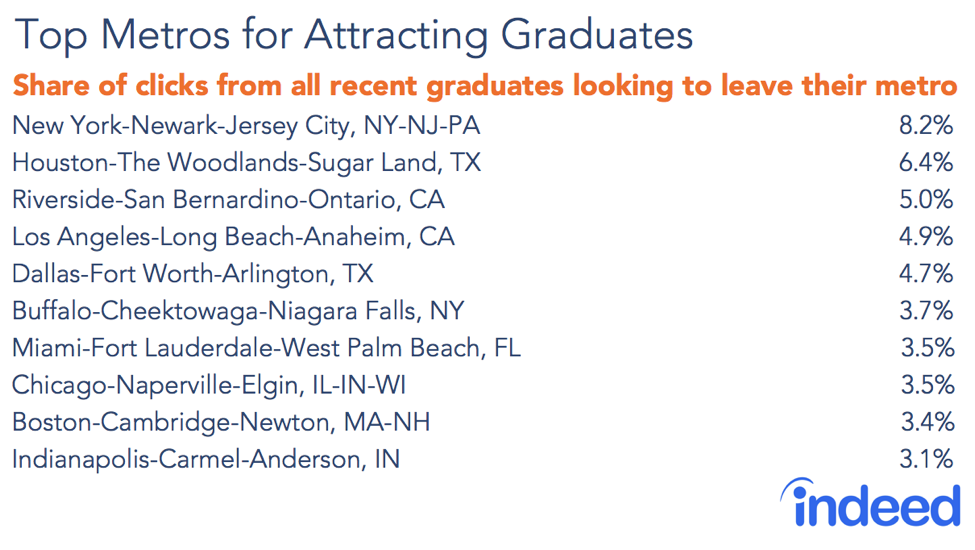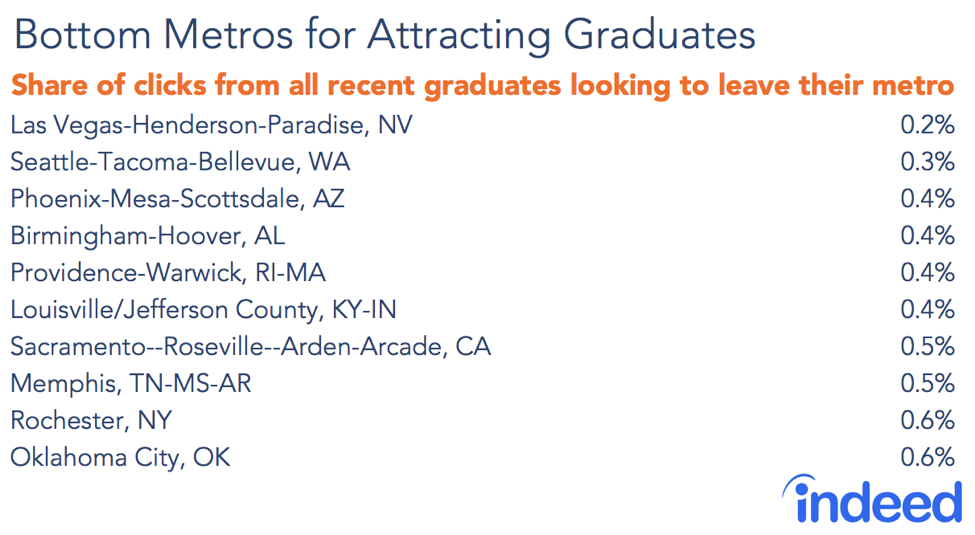The college graduation season is almost upon us and almost two million students are about to get their degrees. As they collect their diplomas, many of them will be asking themselves where they should move for their first post-college job.
College graduates represent a pool of knowledge and talent that can be an important resource and spur to growth for the communities where they choose to live. So Indeed Hiring Lab decided to look at which metros are best at retaining and attracting recent bachelor’s degree graduates. We asked which of the 50 largest metros are getting the largest share of clicks from their recent graduates and which are receiving the largest incoming share of clicks from graduates across these cities.
Which metros are keeping their college graduates?
First, we calculated whether a metro’s recent college graduates were looking for jobs in that same metro or elsewhere. For instance, 78% of the searches by recent graduates of New York colleges were for jobs located in the New York metro area. Atlanta followed closely, posting the second highest share of local graduates looking at metro-area jobs.
Overall, we found that larger metros are more likely to keep their college graduates—and also to attract graduates from other metros. Metro size is a proxy for the number of job postings available for graduates. But it is also likely that large metros have a leg up in the availability of such amenities as culture and nightlife, not to mention the presence of other college graduates to socialize with.
It’s not surprising, given the relationship between size and college graduate retention, that New York is at the top of our list for keeping its college graduates. However, despite the relationship between metro size and the likelihood of keeping graduates, some smaller metros punch above their weight: Las Vegas and Birmingham stand out on this list.

Of course, some metros struggle to retain recent college graduates. The Riverside metro area is particularly unlikely to keep its college graduates. Riverside is close to Los Angeles, so many graduates make the leap to that metro.

Which metros are attracting college graduates from other places?
Of course, local colleges aren’t a metro’s only source of college graduates. We also calculated which metros are particularly likely to attract recent college graduates from across the country. Specifically, we measured which metros are capturing the largest share of clicks from recent grads from the 50 top metros who are looking to leave the city where they went to school. Again, size plays a role, with New York again at the top. Texas is also a standout—both Dallas and Houston do well in attracting college graduates from across the nation. This is particularly interesting since Houston keeps only 41% of its college graduates. Riverside also does well, possibly for the same reason that it loses such a large share of graduates—its proximity to Los Angeles.

Among the metros least likely to attract graduates, several that do very well at retaining their own students struggle to translate local success into national appeal. Las Vegas, Seattle, and Birmingham, AL all are top-ranked for retaining graduates but don’t do as well when it comes to attracting recent graduates from outside. Seattle is a top destination among tech graduates, but it has not been able to draw non-tech graduates to the metro area. However, overall, retaining and attracting graduates are strongly correlated with each other.

For metros trying to draw graduates, size isn’t everything
Metros know that new college graduates are a source of economic growth. In fact, college graduates can make geographic areas more prosperous for all workers. An increase in a metro’s share of college-educated workers boosts wages not only for themselves but for high school dropouts and high school graduates as well.
So what message should metros that want to retain and attract college graduates take from this? Size matters—but it’s not the be all and end all. For instance, once local college graduates get a taste of Las Vegas and Birmingham, they don’t want to leave. Understanding why some cities without the benefit of size are attractive to college graduates can help smaller metros keep and draw this important group.
Methodology
Indeed Hiring Lab looked at the share of recent graduates from colleges in a metro area who clicked on jobs in that metro from January 2016 to March 2018. Recent graduates are those whose most recent educational degree was a bachelor’s and whose experience level was between 0 and 5 years. Hiring Lab focused on the 50 largest metros for looking at metro-specific dynamics. The analysis of which metros were attracting graduates focused on the graduates from the top 50 metros used throughout this piece. Some of the top 50 metros were excluded from the ranking for sample size reasons.






